Employee Entitlement in Workplace: Industrial Instrument Report
VerifiedAdded on 2022/09/15
|8
|2188
|15
Report
AI Summary
This report examines employee relationships within a workplace, focusing on wage entitlements and industrial instruments. The student analyzes feedback from three employees at ABC company, revealing issues such as low wages, lack of overtime pay, and communication problems. The report compares these issues with the National Employment Standards and Fair Work Act, highlighting discrepancies in wage payments and leave policies. The student also discusses the impact of these issues on employee morale and productivity, drawing comparisons with labor disputes in China. The report concludes by emphasizing the importance of adhering to legal instruments for proper employee compensation to improve workplace satisfaction and productivity.
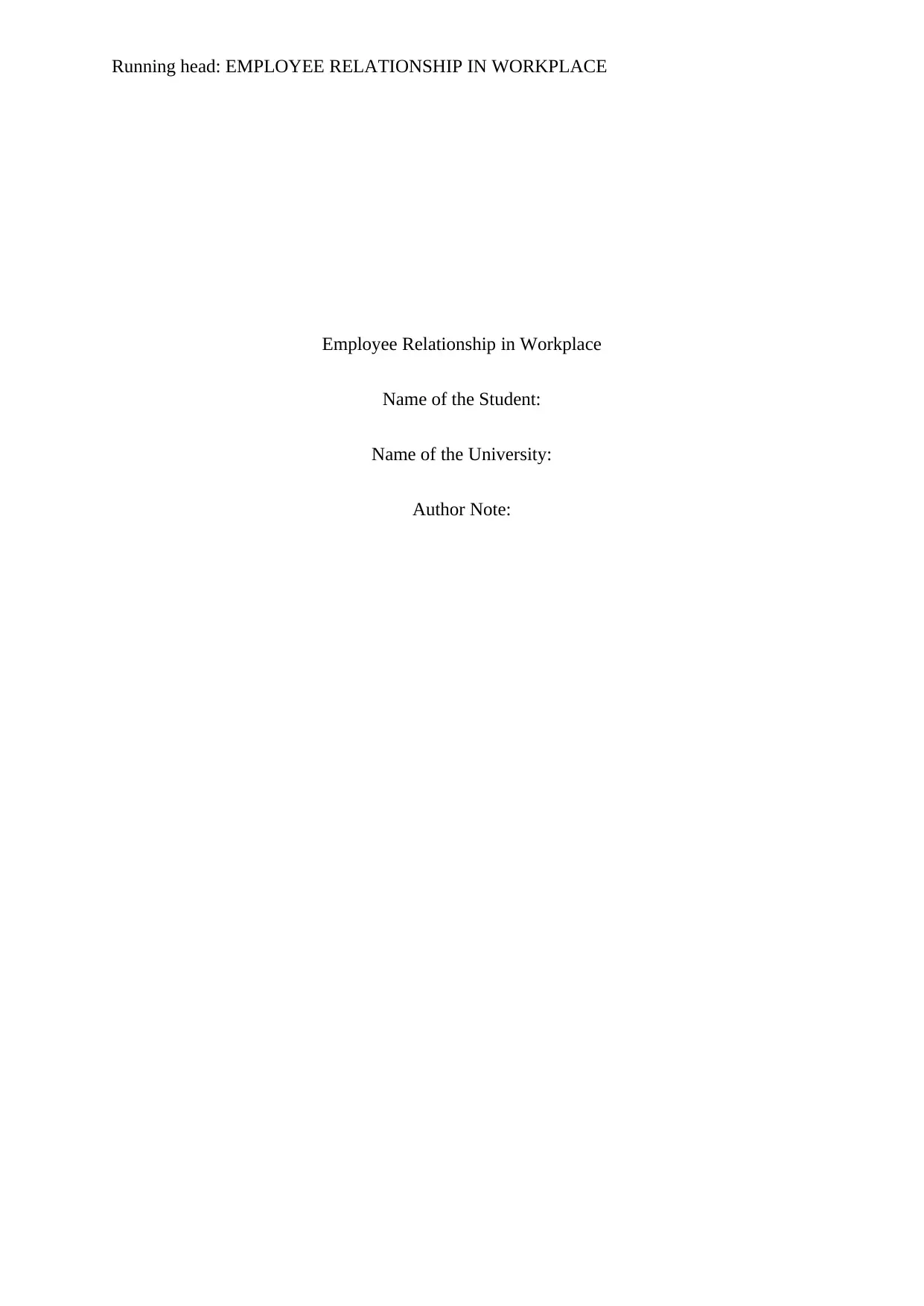
Running head: EMPLOYEE RELATIONSHIP IN WORKPLACE
Employee Relationship in Workplace
Name of the Student:
Name of the University:
Author Note:
Employee Relationship in Workplace
Name of the Student:
Name of the University:
Author Note:
Paraphrase This Document
Need a fresh take? Get an instant paraphrase of this document with our AI Paraphraser
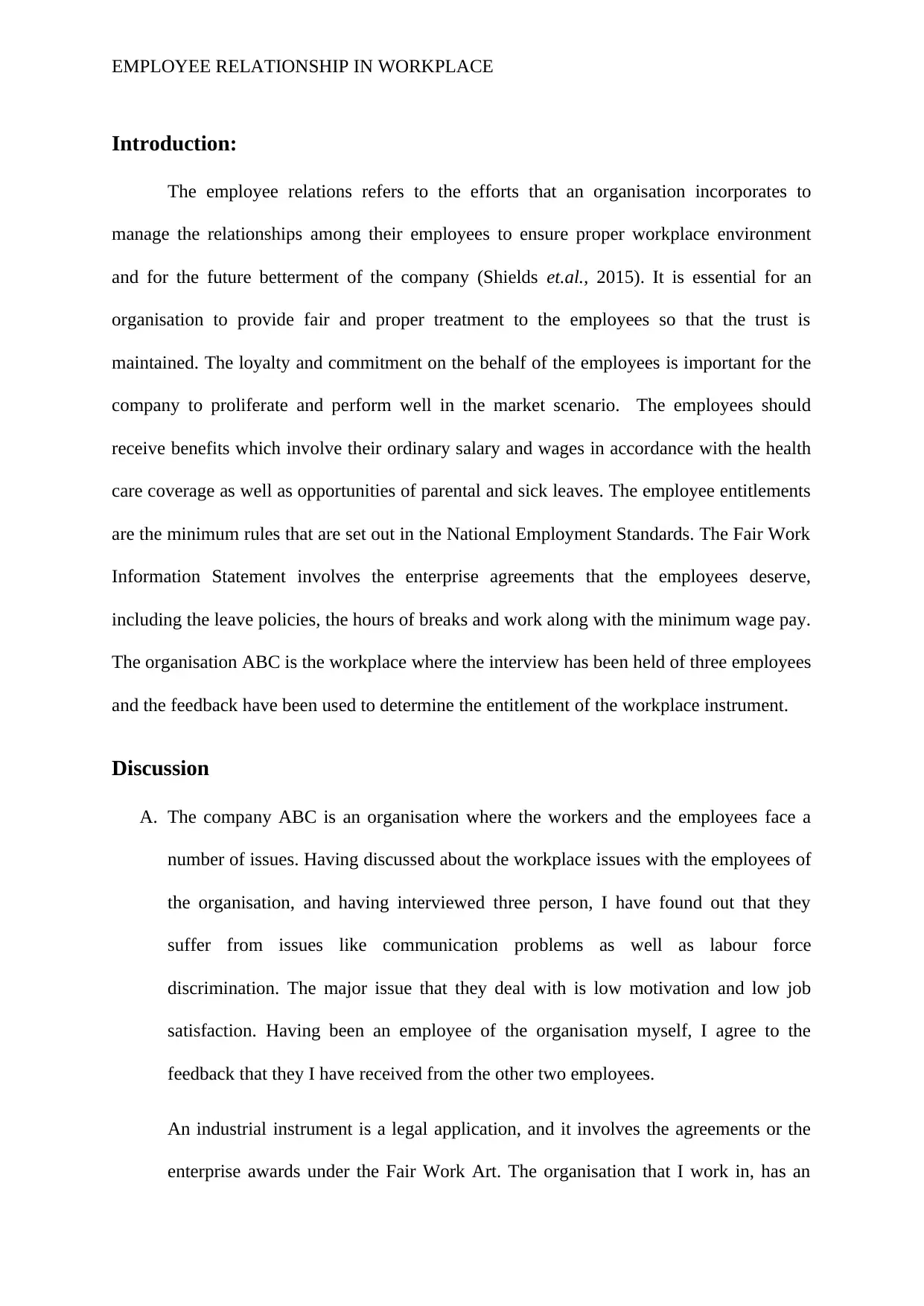
EMPLOYEE RELATIONSHIP IN WORKPLACE
Introduction:
The employee relations refers to the efforts that an organisation incorporates to
manage the relationships among their employees to ensure proper workplace environment
and for the future betterment of the company (Shields et.al., 2015). It is essential for an
organisation to provide fair and proper treatment to the employees so that the trust is
maintained. The loyalty and commitment on the behalf of the employees is important for the
company to proliferate and perform well in the market scenario. The employees should
receive benefits which involve their ordinary salary and wages in accordance with the health
care coverage as well as opportunities of parental and sick leaves. The employee entitlements
are the minimum rules that are set out in the National Employment Standards. The Fair Work
Information Statement involves the enterprise agreements that the employees deserve,
including the leave policies, the hours of breaks and work along with the minimum wage pay.
The organisation ABC is the workplace where the interview has been held of three employees
and the feedback have been used to determine the entitlement of the workplace instrument.
Discussion
A. The company ABC is an organisation where the workers and the employees face a
number of issues. Having discussed about the workplace issues with the employees of
the organisation, and having interviewed three person, I have found out that they
suffer from issues like communication problems as well as labour force
discrimination. The major issue that they deal with is low motivation and low job
satisfaction. Having been an employee of the organisation myself, I agree to the
feedback that they I have received from the other two employees.
An industrial instrument is a legal application, and it involves the agreements or the
enterprise awards under the Fair Work Art. The organisation that I work in, has an
Introduction:
The employee relations refers to the efforts that an organisation incorporates to
manage the relationships among their employees to ensure proper workplace environment
and for the future betterment of the company (Shields et.al., 2015). It is essential for an
organisation to provide fair and proper treatment to the employees so that the trust is
maintained. The loyalty and commitment on the behalf of the employees is important for the
company to proliferate and perform well in the market scenario. The employees should
receive benefits which involve their ordinary salary and wages in accordance with the health
care coverage as well as opportunities of parental and sick leaves. The employee entitlements
are the minimum rules that are set out in the National Employment Standards. The Fair Work
Information Statement involves the enterprise agreements that the employees deserve,
including the leave policies, the hours of breaks and work along with the minimum wage pay.
The organisation ABC is the workplace where the interview has been held of three employees
and the feedback have been used to determine the entitlement of the workplace instrument.
Discussion
A. The company ABC is an organisation where the workers and the employees face a
number of issues. Having discussed about the workplace issues with the employees of
the organisation, and having interviewed three person, I have found out that they
suffer from issues like communication problems as well as labour force
discrimination. The major issue that they deal with is low motivation and low job
satisfaction. Having been an employee of the organisation myself, I agree to the
feedback that they I have received from the other two employees.
An industrial instrument is a legal application, and it involves the agreements or the
enterprise awards under the Fair Work Art. The organisation that I work in, has an
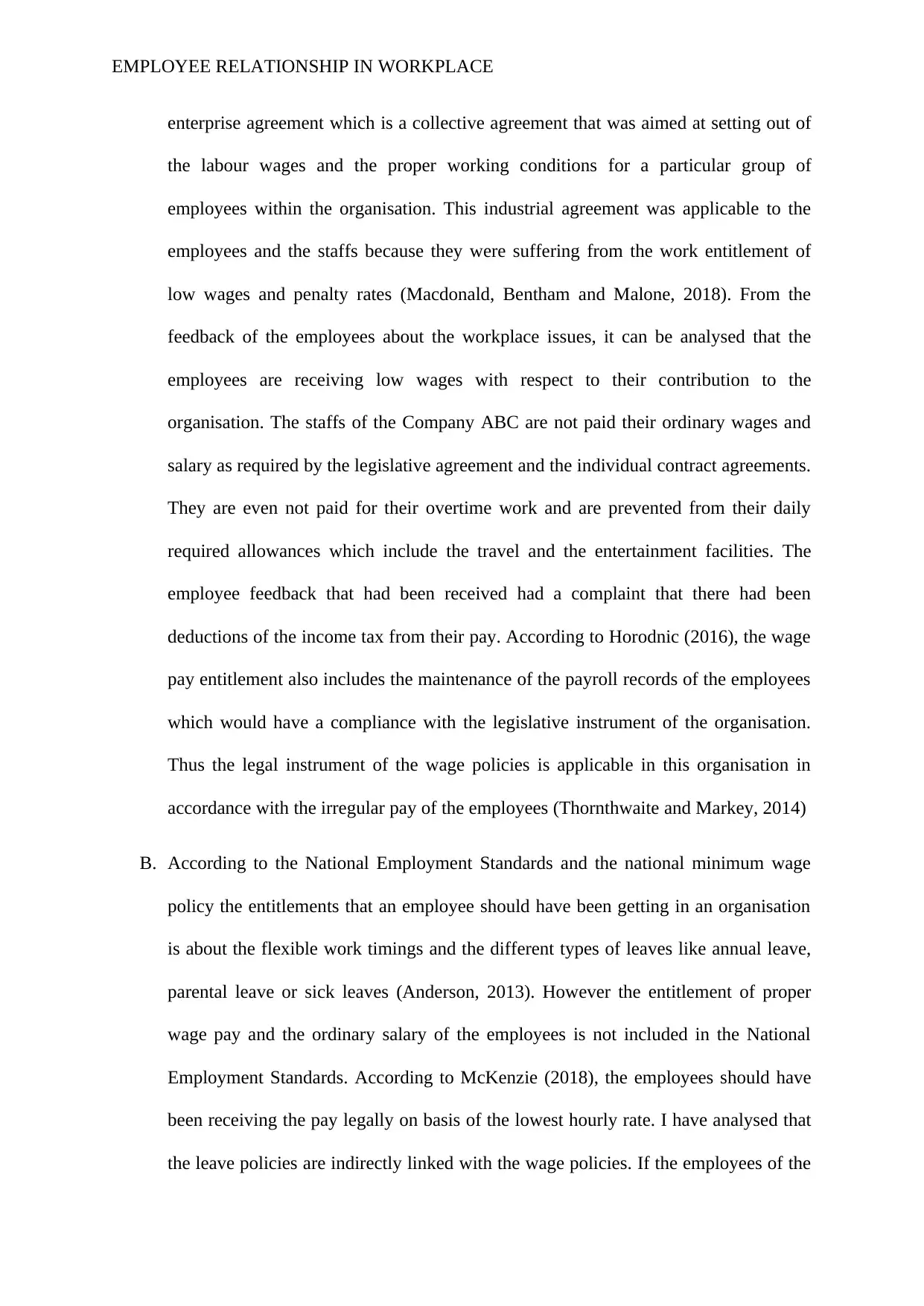
EMPLOYEE RELATIONSHIP IN WORKPLACE
enterprise agreement which is a collective agreement that was aimed at setting out of
the labour wages and the proper working conditions for a particular group of
employees within the organisation. This industrial agreement was applicable to the
employees and the staffs because they were suffering from the work entitlement of
low wages and penalty rates (Macdonald, Bentham and Malone, 2018). From the
feedback of the employees about the workplace issues, it can be analysed that the
employees are receiving low wages with respect to their contribution to the
organisation. The staffs of the Company ABC are not paid their ordinary wages and
salary as required by the legislative agreement and the individual contract agreements.
They are even not paid for their overtime work and are prevented from their daily
required allowances which include the travel and the entertainment facilities. The
employee feedback that had been received had a complaint that there had been
deductions of the income tax from their pay. According to Horodnic (2016), the wage
pay entitlement also includes the maintenance of the payroll records of the employees
which would have a compliance with the legislative instrument of the organisation.
Thus the legal instrument of the wage policies is applicable in this organisation in
accordance with the irregular pay of the employees (Thornthwaite and Markey, 2014)
B. According to the National Employment Standards and the national minimum wage
policy the entitlements that an employee should have been getting in an organisation
is about the flexible work timings and the different types of leaves like annual leave,
parental leave or sick leaves (Anderson, 2013). However the entitlement of proper
wage pay and the ordinary salary of the employees is not included in the National
Employment Standards. According to McKenzie (2018), the employees should have
been receiving the pay legally on basis of the lowest hourly rate. I have analysed that
the leave policies are indirectly linked with the wage policies. If the employees of the
enterprise agreement which is a collective agreement that was aimed at setting out of
the labour wages and the proper working conditions for a particular group of
employees within the organisation. This industrial agreement was applicable to the
employees and the staffs because they were suffering from the work entitlement of
low wages and penalty rates (Macdonald, Bentham and Malone, 2018). From the
feedback of the employees about the workplace issues, it can be analysed that the
employees are receiving low wages with respect to their contribution to the
organisation. The staffs of the Company ABC are not paid their ordinary wages and
salary as required by the legislative agreement and the individual contract agreements.
They are even not paid for their overtime work and are prevented from their daily
required allowances which include the travel and the entertainment facilities. The
employee feedback that had been received had a complaint that there had been
deductions of the income tax from their pay. According to Horodnic (2016), the wage
pay entitlement also includes the maintenance of the payroll records of the employees
which would have a compliance with the legislative instrument of the organisation.
Thus the legal instrument of the wage policies is applicable in this organisation in
accordance with the irregular pay of the employees (Thornthwaite and Markey, 2014)
B. According to the National Employment Standards and the national minimum wage
policy the entitlements that an employee should have been getting in an organisation
is about the flexible work timings and the different types of leaves like annual leave,
parental leave or sick leaves (Anderson, 2013). However the entitlement of proper
wage pay and the ordinary salary of the employees is not included in the National
Employment Standards. According to McKenzie (2018), the employees should have
been receiving the pay legally on basis of the lowest hourly rate. I have analysed that
the leave policies are indirectly linked with the wage policies. If the employees of the
⊘ This is a preview!⊘
Do you want full access?
Subscribe today to unlock all pages.

Trusted by 1+ million students worldwide
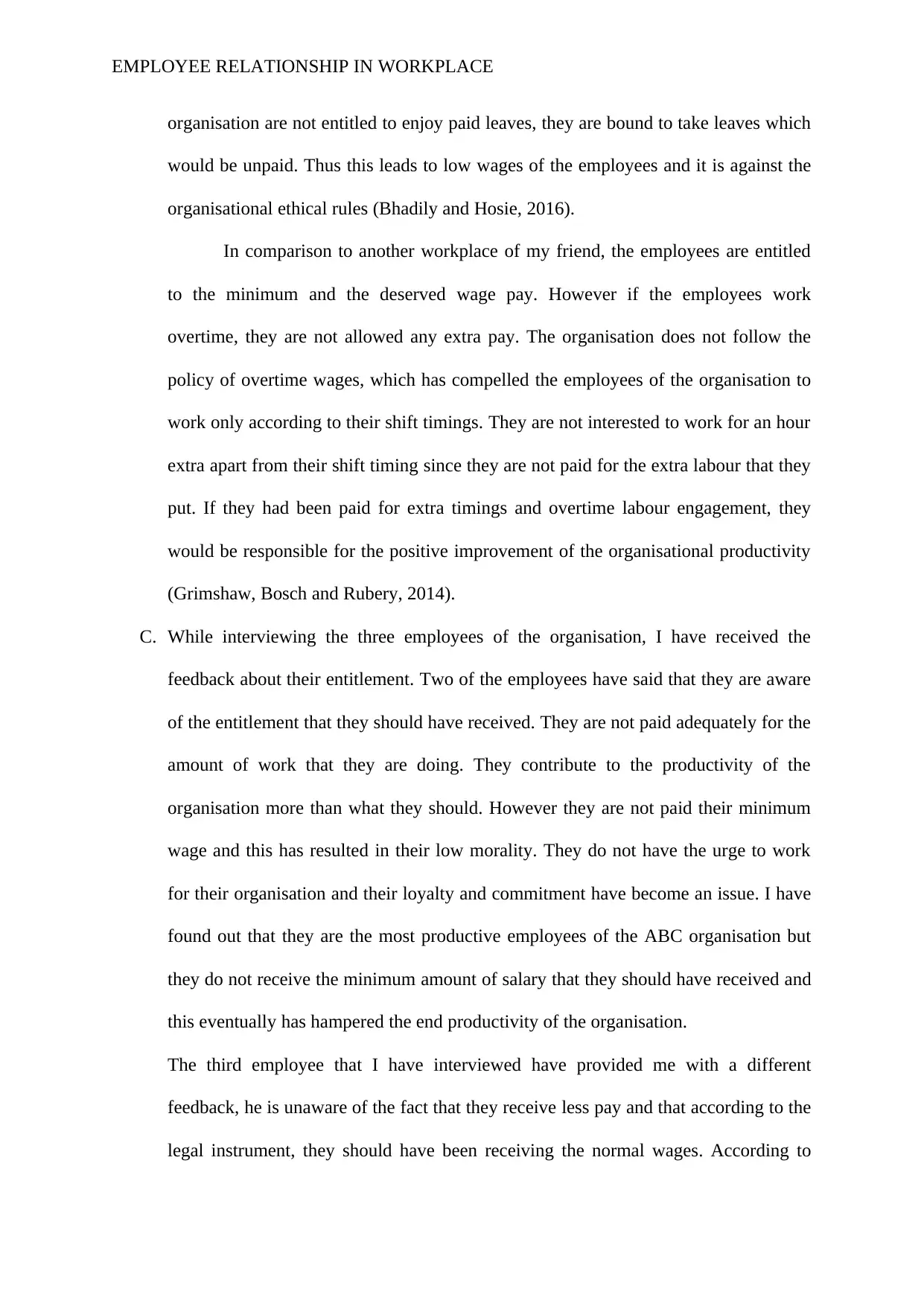
EMPLOYEE RELATIONSHIP IN WORKPLACE
organisation are not entitled to enjoy paid leaves, they are bound to take leaves which
would be unpaid. Thus this leads to low wages of the employees and it is against the
organisational ethical rules (Bhadily and Hosie, 2016).
In comparison to another workplace of my friend, the employees are entitled
to the minimum and the deserved wage pay. However if the employees work
overtime, they are not allowed any extra pay. The organisation does not follow the
policy of overtime wages, which has compelled the employees of the organisation to
work only according to their shift timings. They are not interested to work for an hour
extra apart from their shift timing since they are not paid for the extra labour that they
put. If they had been paid for extra timings and overtime labour engagement, they
would be responsible for the positive improvement of the organisational productivity
(Grimshaw, Bosch and Rubery, 2014).
C. While interviewing the three employees of the organisation, I have received the
feedback about their entitlement. Two of the employees have said that they are aware
of the entitlement that they should have received. They are not paid adequately for the
amount of work that they are doing. They contribute to the productivity of the
organisation more than what they should. However they are not paid their minimum
wage and this has resulted in their low morality. They do not have the urge to work
for their organisation and their loyalty and commitment have become an issue. I have
found out that they are the most productive employees of the ABC organisation but
they do not receive the minimum amount of salary that they should have received and
this eventually has hampered the end productivity of the organisation.
The third employee that I have interviewed have provided me with a different
feedback, he is unaware of the fact that they receive less pay and that according to the
legal instrument, they should have been receiving the normal wages. According to
organisation are not entitled to enjoy paid leaves, they are bound to take leaves which
would be unpaid. Thus this leads to low wages of the employees and it is against the
organisational ethical rules (Bhadily and Hosie, 2016).
In comparison to another workplace of my friend, the employees are entitled
to the minimum and the deserved wage pay. However if the employees work
overtime, they are not allowed any extra pay. The organisation does not follow the
policy of overtime wages, which has compelled the employees of the organisation to
work only according to their shift timings. They are not interested to work for an hour
extra apart from their shift timing since they are not paid for the extra labour that they
put. If they had been paid for extra timings and overtime labour engagement, they
would be responsible for the positive improvement of the organisational productivity
(Grimshaw, Bosch and Rubery, 2014).
C. While interviewing the three employees of the organisation, I have received the
feedback about their entitlement. Two of the employees have said that they are aware
of the entitlement that they should have received. They are not paid adequately for the
amount of work that they are doing. They contribute to the productivity of the
organisation more than what they should. However they are not paid their minimum
wage and this has resulted in their low morality. They do not have the urge to work
for their organisation and their loyalty and commitment have become an issue. I have
found out that they are the most productive employees of the ABC organisation but
they do not receive the minimum amount of salary that they should have received and
this eventually has hampered the end productivity of the organisation.
The third employee that I have interviewed have provided me with a different
feedback, he is unaware of the fact that they receive less pay and that according to the
legal instrument, they should have been receiving the normal wages. According to
Paraphrase This Document
Need a fresh take? Get an instant paraphrase of this document with our AI Paraphraser
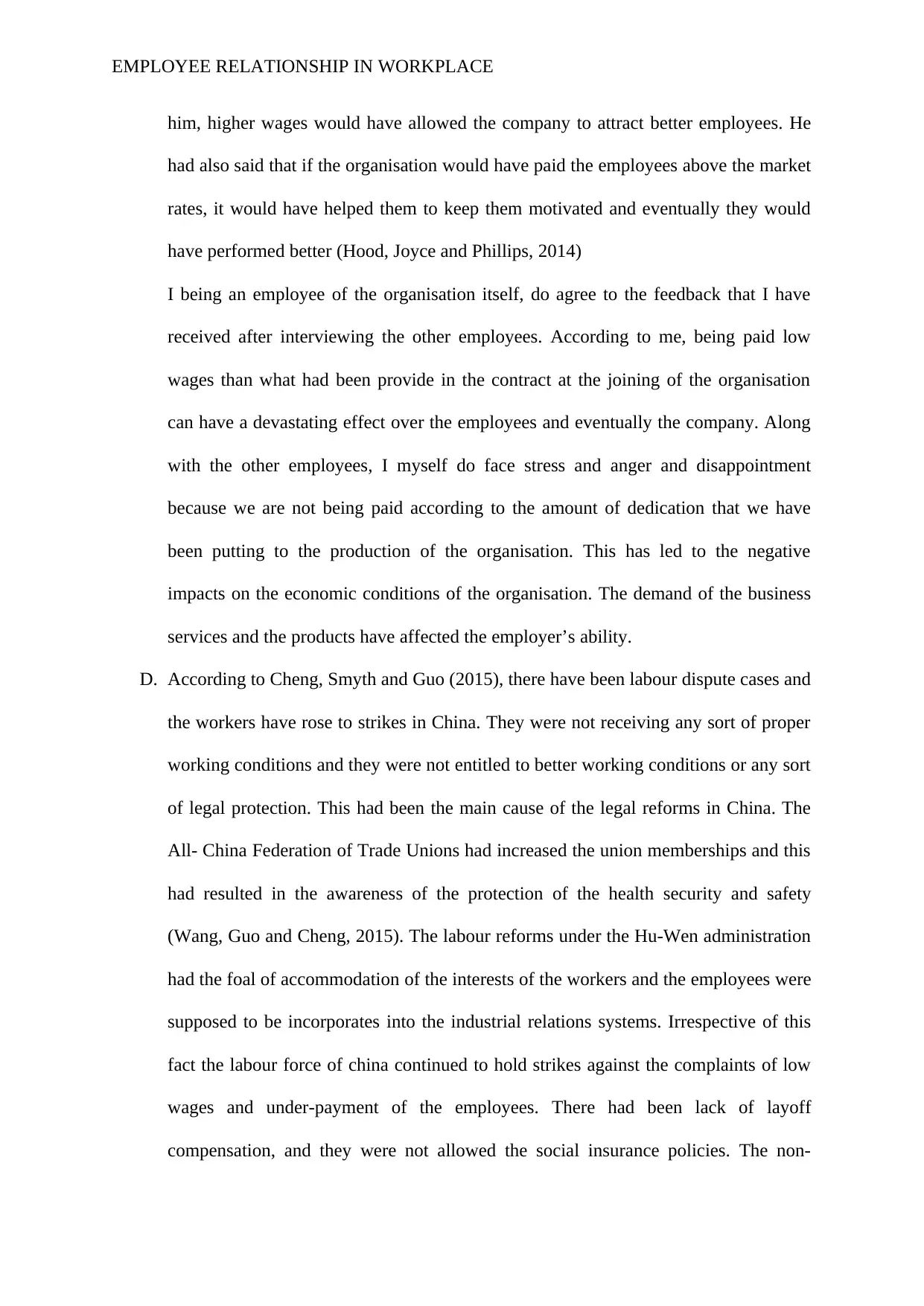
EMPLOYEE RELATIONSHIP IN WORKPLACE
him, higher wages would have allowed the company to attract better employees. He
had also said that if the organisation would have paid the employees above the market
rates, it would have helped them to keep them motivated and eventually they would
have performed better (Hood, Joyce and Phillips, 2014)
I being an employee of the organisation itself, do agree to the feedback that I have
received after interviewing the other employees. According to me, being paid low
wages than what had been provide in the contract at the joining of the organisation
can have a devastating effect over the employees and eventually the company. Along
with the other employees, I myself do face stress and anger and disappointment
because we are not being paid according to the amount of dedication that we have
been putting to the production of the organisation. This has led to the negative
impacts on the economic conditions of the organisation. The demand of the business
services and the products have affected the employer’s ability.
D. According to Cheng, Smyth and Guo (2015), there have been labour dispute cases and
the workers have rose to strikes in China. They were not receiving any sort of proper
working conditions and they were not entitled to better working conditions or any sort
of legal protection. This had been the main cause of the legal reforms in China. The
All- China Federation of Trade Unions had increased the union memberships and this
had resulted in the awareness of the protection of the health security and safety
(Wang, Guo and Cheng, 2015). The labour reforms under the Hu-Wen administration
had the foal of accommodation of the interests of the workers and the employees were
supposed to be incorporates into the industrial relations systems. Irrespective of this
fact the labour force of china continued to hold strikes against the complaints of low
wages and under-payment of the employees. There had been lack of layoff
compensation, and they were not allowed the social insurance policies. The non-
him, higher wages would have allowed the company to attract better employees. He
had also said that if the organisation would have paid the employees above the market
rates, it would have helped them to keep them motivated and eventually they would
have performed better (Hood, Joyce and Phillips, 2014)
I being an employee of the organisation itself, do agree to the feedback that I have
received after interviewing the other employees. According to me, being paid low
wages than what had been provide in the contract at the joining of the organisation
can have a devastating effect over the employees and eventually the company. Along
with the other employees, I myself do face stress and anger and disappointment
because we are not being paid according to the amount of dedication that we have
been putting to the production of the organisation. This has led to the negative
impacts on the economic conditions of the organisation. The demand of the business
services and the products have affected the employer’s ability.
D. According to Cheng, Smyth and Guo (2015), there have been labour dispute cases and
the workers have rose to strikes in China. They were not receiving any sort of proper
working conditions and they were not entitled to better working conditions or any sort
of legal protection. This had been the main cause of the legal reforms in China. The
All- China Federation of Trade Unions had increased the union memberships and this
had resulted in the awareness of the protection of the health security and safety
(Wang, Guo and Cheng, 2015). The labour reforms under the Hu-Wen administration
had the foal of accommodation of the interests of the workers and the employees were
supposed to be incorporates into the industrial relations systems. Irrespective of this
fact the labour force of china continued to hold strikes against the complaints of low
wages and under-payment of the employees. There had been lack of layoff
compensation, and they were not allowed the social insurance policies. The non-
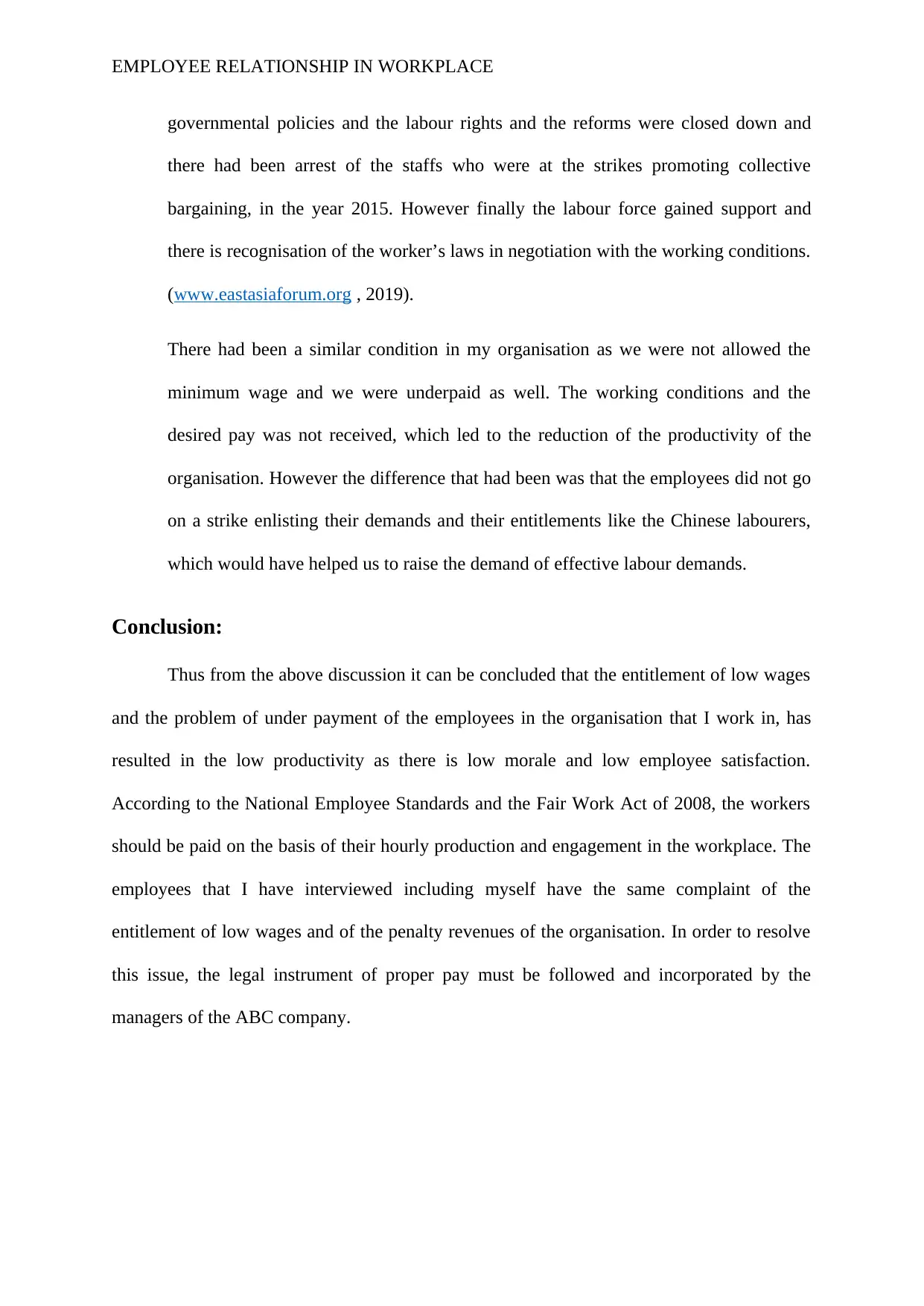
EMPLOYEE RELATIONSHIP IN WORKPLACE
governmental policies and the labour rights and the reforms were closed down and
there had been arrest of the staffs who were at the strikes promoting collective
bargaining, in the year 2015. However finally the labour force gained support and
there is recognisation of the worker’s laws in negotiation with the working conditions.
(www.eastasiaforum.org , 2019).
There had been a similar condition in my organisation as we were not allowed the
minimum wage and we were underpaid as well. The working conditions and the
desired pay was not received, which led to the reduction of the productivity of the
organisation. However the difference that had been was that the employees did not go
on a strike enlisting their demands and their entitlements like the Chinese labourers,
which would have helped us to raise the demand of effective labour demands.
Conclusion:
Thus from the above discussion it can be concluded that the entitlement of low wages
and the problem of under payment of the employees in the organisation that I work in, has
resulted in the low productivity as there is low morale and low employee satisfaction.
According to the National Employee Standards and the Fair Work Act of 2008, the workers
should be paid on the basis of their hourly production and engagement in the workplace. The
employees that I have interviewed including myself have the same complaint of the
entitlement of low wages and of the penalty revenues of the organisation. In order to resolve
this issue, the legal instrument of proper pay must be followed and incorporated by the
managers of the ABC company.
governmental policies and the labour rights and the reforms were closed down and
there had been arrest of the staffs who were at the strikes promoting collective
bargaining, in the year 2015. However finally the labour force gained support and
there is recognisation of the worker’s laws in negotiation with the working conditions.
(www.eastasiaforum.org , 2019).
There had been a similar condition in my organisation as we were not allowed the
minimum wage and we were underpaid as well. The working conditions and the
desired pay was not received, which led to the reduction of the productivity of the
organisation. However the difference that had been was that the employees did not go
on a strike enlisting their demands and their entitlements like the Chinese labourers,
which would have helped us to raise the demand of effective labour demands.
Conclusion:
Thus from the above discussion it can be concluded that the entitlement of low wages
and the problem of under payment of the employees in the organisation that I work in, has
resulted in the low productivity as there is low morale and low employee satisfaction.
According to the National Employee Standards and the Fair Work Act of 2008, the workers
should be paid on the basis of their hourly production and engagement in the workplace. The
employees that I have interviewed including myself have the same complaint of the
entitlement of low wages and of the penalty revenues of the organisation. In order to resolve
this issue, the legal instrument of proper pay must be followed and incorporated by the
managers of the ABC company.
⊘ This is a preview!⊘
Do you want full access?
Subscribe today to unlock all pages.

Trusted by 1+ million students worldwide
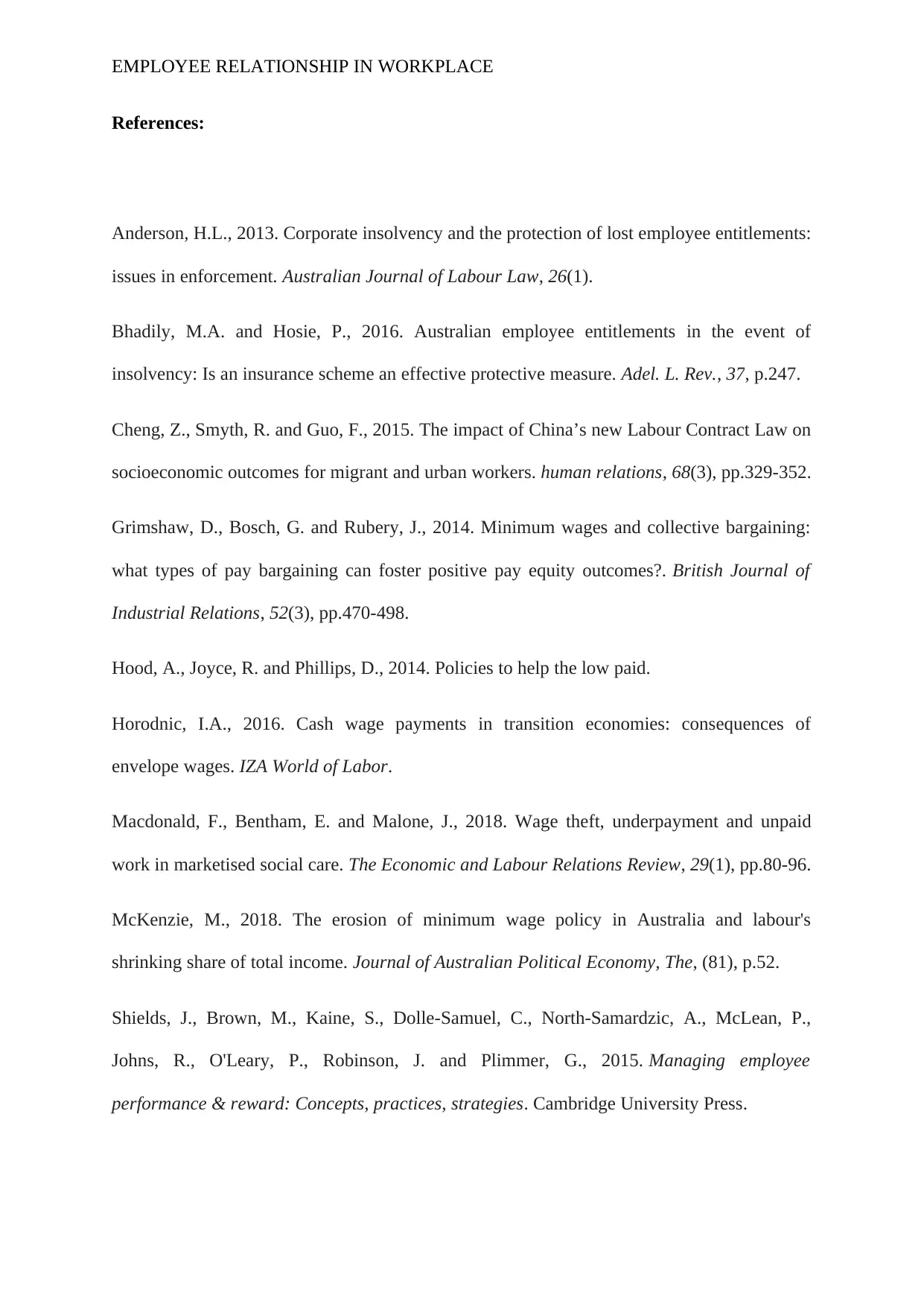
EMPLOYEE RELATIONSHIP IN WORKPLACE
References:
Anderson, H.L., 2013. Corporate insolvency and the protection of lost employee entitlements:
issues in enforcement. Australian Journal of Labour Law, 26(1).
Bhadily, M.A. and Hosie, P., 2016. Australian employee entitlements in the event of
insolvency: Is an insurance scheme an effective protective measure. Adel. L. Rev., 37, p.247.
Cheng, Z., Smyth, R. and Guo, F., 2015. The impact of China’s new Labour Contract Law on
socioeconomic outcomes for migrant and urban workers. human relations, 68(3), pp.329-352.
Grimshaw, D., Bosch, G. and Rubery, J., 2014. Minimum wages and collective bargaining:
what types of pay bargaining can foster positive pay equity outcomes?. British Journal of
Industrial Relations, 52(3), pp.470-498.
Hood, A., Joyce, R. and Phillips, D., 2014. Policies to help the low paid.
Horodnic, I.A., 2016. Cash wage payments in transition economies: consequences of
envelope wages. IZA World of Labor.
Macdonald, F., Bentham, E. and Malone, J., 2018. Wage theft, underpayment and unpaid
work in marketised social care. The Economic and Labour Relations Review, 29(1), pp.80-96.
McKenzie, M., 2018. The erosion of minimum wage policy in Australia and labour's
shrinking share of total income. Journal of Australian Political Economy, The, (81), p.52.
Shields, J., Brown, M., Kaine, S., Dolle-Samuel, C., North-Samardzic, A., McLean, P.,
Johns, R., O'Leary, P., Robinson, J. and Plimmer, G., 2015. Managing employee
performance & reward: Concepts, practices, strategies. Cambridge University Press.
References:
Anderson, H.L., 2013. Corporate insolvency and the protection of lost employee entitlements:
issues in enforcement. Australian Journal of Labour Law, 26(1).
Bhadily, M.A. and Hosie, P., 2016. Australian employee entitlements in the event of
insolvency: Is an insurance scheme an effective protective measure. Adel. L. Rev., 37, p.247.
Cheng, Z., Smyth, R. and Guo, F., 2015. The impact of China’s new Labour Contract Law on
socioeconomic outcomes for migrant and urban workers. human relations, 68(3), pp.329-352.
Grimshaw, D., Bosch, G. and Rubery, J., 2014. Minimum wages and collective bargaining:
what types of pay bargaining can foster positive pay equity outcomes?. British Journal of
Industrial Relations, 52(3), pp.470-498.
Hood, A., Joyce, R. and Phillips, D., 2014. Policies to help the low paid.
Horodnic, I.A., 2016. Cash wage payments in transition economies: consequences of
envelope wages. IZA World of Labor.
Macdonald, F., Bentham, E. and Malone, J., 2018. Wage theft, underpayment and unpaid
work in marketised social care. The Economic and Labour Relations Review, 29(1), pp.80-96.
McKenzie, M., 2018. The erosion of minimum wage policy in Australia and labour's
shrinking share of total income. Journal of Australian Political Economy, The, (81), p.52.
Shields, J., Brown, M., Kaine, S., Dolle-Samuel, C., North-Samardzic, A., McLean, P.,
Johns, R., O'Leary, P., Robinson, J. and Plimmer, G., 2015. Managing employee
performance & reward: Concepts, practices, strategies. Cambridge University Press.
Paraphrase This Document
Need a fresh take? Get an instant paraphrase of this document with our AI Paraphraser
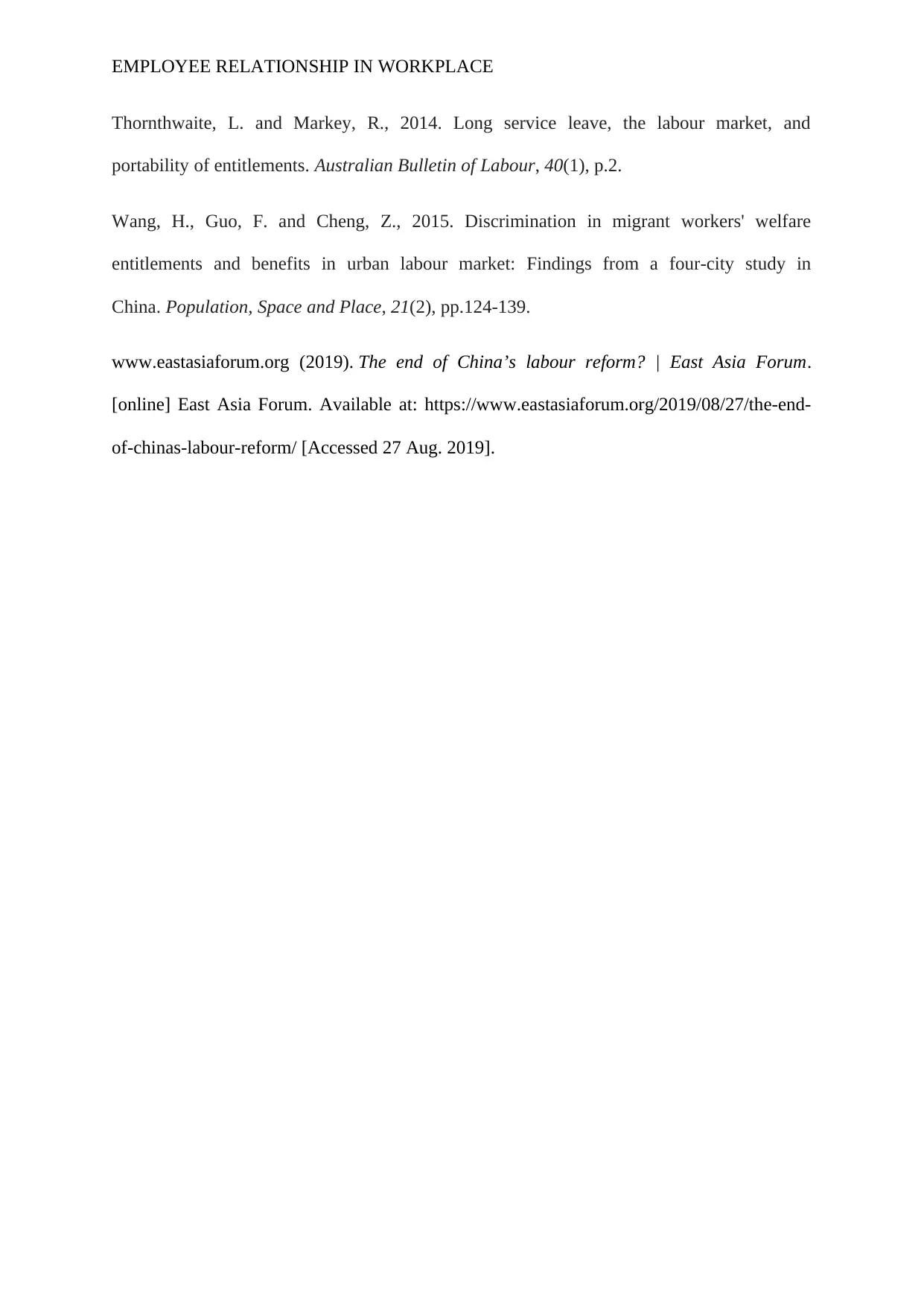
EMPLOYEE RELATIONSHIP IN WORKPLACE
Thornthwaite, L. and Markey, R., 2014. Long service leave, the labour market, and
portability of entitlements. Australian Bulletin of Labour, 40(1), p.2.
Wang, H., Guo, F. and Cheng, Z., 2015. Discrimination in migrant workers' welfare
entitlements and benefits in urban labour market: Findings from a four‐city study in
China. Population, Space and Place, 21(2), pp.124-139.
www.eastasiaforum.org (2019). The end of China’s labour reform? | East Asia Forum.
[online] East Asia Forum. Available at: https://www.eastasiaforum.org/2019/08/27/the-end-
of-chinas-labour-reform/ [Accessed 27 Aug. 2019].
Thornthwaite, L. and Markey, R., 2014. Long service leave, the labour market, and
portability of entitlements. Australian Bulletin of Labour, 40(1), p.2.
Wang, H., Guo, F. and Cheng, Z., 2015. Discrimination in migrant workers' welfare
entitlements and benefits in urban labour market: Findings from a four‐city study in
China. Population, Space and Place, 21(2), pp.124-139.
www.eastasiaforum.org (2019). The end of China’s labour reform? | East Asia Forum.
[online] East Asia Forum. Available at: https://www.eastasiaforum.org/2019/08/27/the-end-
of-chinas-labour-reform/ [Accessed 27 Aug. 2019].
1 out of 8
Related Documents
Your All-in-One AI-Powered Toolkit for Academic Success.
+13062052269
info@desklib.com
Available 24*7 on WhatsApp / Email
![[object Object]](/_next/static/media/star-bottom.7253800d.svg)
Unlock your academic potential
Copyright © 2020–2025 A2Z Services. All Rights Reserved. Developed and managed by ZUCOL.





